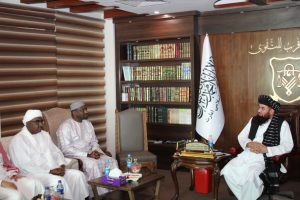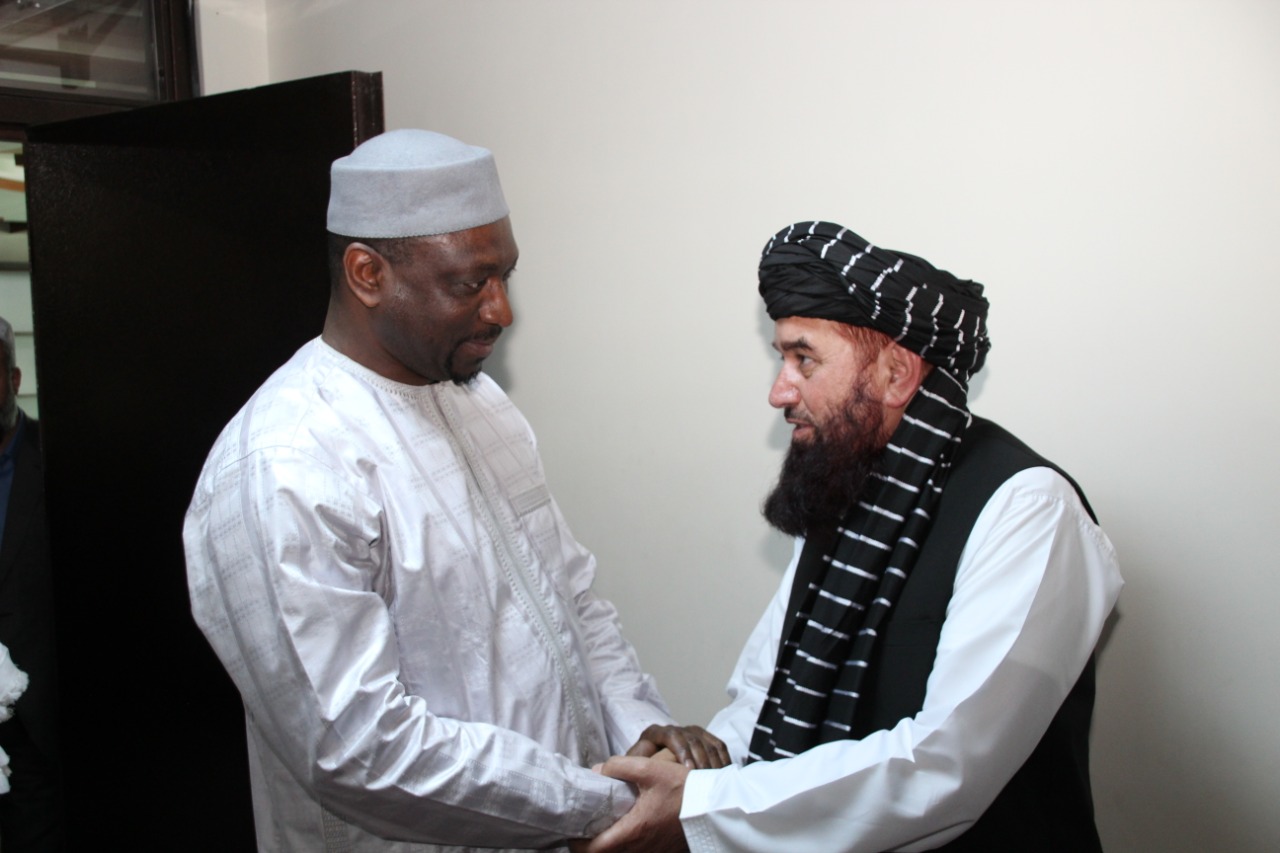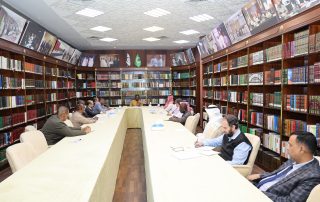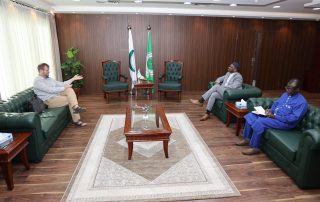
H.E. Mullah Abdul Hakim Shari’i, Acting Minister of Justice in the current authority in Afghanistan, received H.E. Prof. Koutoub Moustapha Sano, Secretary General of the International Islamic Fiqh Academy (IIFA), and the accompanying delegation of Muslim scholars at the headquarters of the Ministry of Justice in Kabul, Afghanistan, on Tuesday 21 Dhu al-Qi’dah 1443H corresponding to 22 June 2022G.
His Excellency the Minister welcomed the delegation and thanked them for visiting Afghanistan at this difficult stage that the State of Afghanistan is going through in order to meet the current authority, praising the great role entrusted to the Organization of Islamic Cooperation (OIC) in general and to the Academy, especially in defending the interests and rights of Muslims. His Excellency also expressed his aspiration for the scholars to play their role in urging their countries to help the current authority in Afghanistan, and to recognize it as the legitimate authority representing the Afghan people, noting the steadfastness, struggle and sacrifice that the current authority provided for the Afghan people during the past twenty years.
For his part, His Excellency the Secretary General, head of the delegation, expressed his heartfelt thanks and great gratitude to the current authority for the generous hospitality and warm welcome, and to His Excellency the minister for giving the delegation the opportunity to meet with him at the beginning of their visit to Afghanistan, noting in this regard the ancient Afghan tradition of glorifying scholars and revering saints and elders, praising the security that the delegation has received since its arrival in Kabul, asking God the Almighty to provide continuous stability for the Afghan people.
Then His Excellency presented an introductory overview of the Academy as the supreme jurisprudential reference for the Muslim Ummah inside and outside the Muslim world. His Excellency also spoke about the most important objectives of the visit of the delegation of Muslim scholars, in implementation of the directives of the leaders of the Muslim world, which is to discuss and engage with the current authority, scholars and officials, on a number of issues and topics of concern to the Afghan people, especially the issue of tolerance, coexistence and harmony among followers of religions and sects, the issue of extremism and terrorism, and the issue of women’s education and work.
To achieve this, His Excellency spoke on behalf of the delegation about the importance of spreading the culture of moderation, tolerance and coexistence in Islam, citing a number of the verses of the Noble Qur’an and the authentic Sunnah of the Prophet. His Excellency clarified that “the verses forbidding compulsion in religion, such as ((Let there be no compulsion in religion)), ((You have your way, and I have my Way)), ((Would you then force people to become believers?)), are all verses that establish coexistence and tolerance and enjoin it at every time and in every place. It means that extremism, fanaticism and terrorism are all crimes committed in the name of Islam, and Islam is innocent from it.”
With regard to the issue of women’s education, His Excellency clarified that “education in Islam is considered a sacred and fixed right over which there is no dispute. It is also a great obligation for every Muslim in society, and it is not permissible to differentiate between a man and a woman, because the Quranic and hadith texts on this topic ordering to seek knowledge never differentiated between a man and a woman, nor between young and old, but rather made it obligatory for everyone to request it. The verse “Read” is an order for the Noble Prophet, upon whom be the best prayer and peace, to read which is the request for knowledge, and this matter is an order for his entire Ummah. Equally, the verse ((Are those who know equal to those who do not know?)) is for both men and women, and there is no difference in that between male and female. Also the hadith: {seeking knowledge is an obligation for every Muslim}, and in another narration {and a Muslim woman}, there is a clear text that seeking knowledge is obligatory for both sexes without exception.” His Excellency added that educating women is one of the most emphatic duties and the greatest of offerings that ensures the education of generations, because woman is the most influential school that should be prepared in an integrated manner, which requires concerted efforts and harnessing all capabilities in order to ensure her education in all modern educational stages and in all areas that society needs such as medicine, nursing, economics, architecture, engineering, literature, language and others.
As for women’s work, His Excellency explained that “work is an obligation and a duty for both sexes as evidenced by the texts of the Noble Qur’an, the honorable Sunnah of the Prophet, and the consensus of the Ummah. The Messenger of God, may God’s prayers and peace be upon him and his family, his companions and their followers, practiced this, as they allowed women to work and participate in all the jobs that men used to do, such as trade, dyeing, weaving, teaching, and nursing, etc. Work is considered an act of worship among the acts of worship imposed on both sexes, such as prayer, zakat, fasting, Hajj, righteousness, justice, loyalty, integrity, and others, just as Islam has never differentiated between a male and a female, or a man and a woman in performing the above-mentioned duties and obligations, likewise, it never differentiated between the sexes in the obligation to work, and therefore, preventing one of them, male or female, from carrying out this great duty contradicts the teachings of the true religion that commanded it to them.” Hence, the woman’s work is according to the Shariah regulations decided by the Ruler in every era and country is in fact a matter of consensus among the scholars of the Ummah, and it is not permissible to leave this clear Shariah duty for considerations that contradict what is indicated by the texts of the Qur’an, Sunnah and consensus. His Excellency clarified that “women’s work is not in any way considered to be displaying, rather the forbidden displaying is the displaying of the pre-Islamic era in which women do not adhere to the Islamic veil. Also a woman’s work is in no way considered a violation of the order to stay home that was mentioned in Surat Al-Ahzab ((Settle in your homes, and do not display yourselves as women did in the days of ˹pre-Islamic˺ ignorance)), because the command to stay home in this verse is specific to the Prophet’s wives, peace and blessings be upon him, because, as the verse stipulates, they are not like any of the women, and therefore, they are commanded to wear two types of veil, and they are: the veil of persons, the veil of the body, and according to the veil of persons, they are obliged to stay indoors and do not go out except for necessity, and according to the veil of the body, they must adhere to the well-known Shariah veil when they go out of necessity. As for the rest of the Muslim women, it is agreed upon that they concerned with the veil of persons that necessitates staying in the homes, but what is obligatory in their case is the veil of the body, which requires adherence to the Shariah rules of dress, which is the well-known Islamic veil.”
After this clarification and clear analysis from the head of the delegation, the delegation called on the current authority in Afghanistan to do everything in its power to enable Afghan girls to return quickly to schools in government schools which are still closed to middle and secondary school female students, especially that Female students of the primary and university levels continue their studies, and female students in the private sector at all educational levels, especially the intermediate and secondary stages, continue their studies without interruption. The delegation therefore urgently insisted on the authority to allow middle and secondary school students in government schools to return to school, like their sisters in private schools. The delegation also called on the authority to allow Afghan women to work and participate in the efforts of renaissance, progress and development, in accordance with the Shariah regulations decided by the authority based on the Afghan reality.
His Excellency the Minister reassured the delegation of conveying the scholars’ appeal to the concerned authorities and reiterated his thanks to the delegation and invited them for future visits.

Read Also
Lastest








